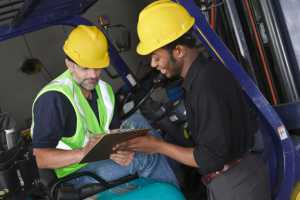Career options for forklift qualification holders
 There are numerous different kinds of forklifts you can be trained to operate, but there seems to be a lack of knowledge out there when it comes to what kind of career options there are if you work to obtain your forklift qualifications.
There are numerous different kinds of forklifts you can be trained to operate, but there seems to be a lack of knowledge out there when it comes to what kind of career options there are if you work to obtain your forklift qualifications.
It can seem like a daunting thing to take on, especially if you’re currently unemployed and are resting your hopes on a qualification helping you to find work. To help you get a better idea of what forklift qualifications are useful for, and what your options are, we have put together a short guide.
What level can I reach?
The burning question for most people is how far a forklift qualification can take you. While it’s clearly aimed at forklift operation, the skills you learn can help you get on the employment ladder. There are always opportunities available for forklift operators and although some might require experience, you can always look into apprenticeships if you have no previous hands-on experience.
One thing your qualifications will show is that you can focus and follow a challenge through to successful completion – you wouldn’t believe how much of an impression this can make on employers. If you stick with a good company for long enough you could see your way to further training and possibly work your way up to more senior positions.
Which sectors can I work in?
When people think of forklifts they simply see lifting and moving items in a warehouse, and while warehouses offer large swathes of jobs it can be more diverse than that one sector. The shipping industry, airports and a variety of industrial employers need people who are qualified to operate a forklift. Forklift qualifications could see you get a foot in the door in one industry and you might then find it easier to pick and choose the sector you want to follow with the experience behind you.
What could I earn and how many hours will I work?
This all depends on you and the company you join. Starting wage in forklift positions starts at around £12,000, with progressions upwards the longer you stay, ultimately a more experienced worker can expect to get around £21,000.
Of course, the nature of most ports, warehouses and industrial businesses means they work around the clock, meaning there are always extra shifts and hours to be taken up. The better you perform the more hours you could find yourself getting. Full time operators could find themselves working anything from 37 to 45 hours with mornings, days and night patterns depending on the business.
At Euro 1 Training we provide comprehensive training for a variety of forklifts, depending on your aims with everything from industrial reach training to counter balance training. To discuss your forklift training needs – whether you’re a novice or more experienced – contact our professional team today and we’ll be happy to help.
